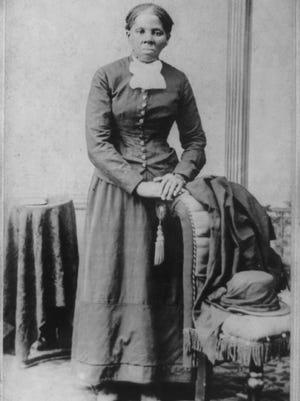Harriet Tubman: Slavery to humanitarian to legend

Harriet Tubman was born into slavery on the Anthony Thompson Farm in the Peter's Neck District, near Madison, Maryland. She grew up in Bucktown, where she worked with her mother as a house slave and in the fields, compelled by hard masters to toil in the sweltering Eastern Shore summers.
Maybe there is something about the saying "what does not kill us makes us stronger." Harriet's biographers record instances of her suffering and the aching need for a better way to live. But she didn't whine. She didn't complain. She grew ever stronger — strong enough to harbor the hope that one day she would be free.
Harriet learned all she could about a world beyond the one in which she lived — learning to follow the North Star, what wild food was safe to eat and so much more. She built partnerships with all kinds of people who helped her accomplish her goals.
At the time, there were no telephones, but news traveled far when the underground supporters of abolition spread their net by land and water.
Freedom was her goal throughout her life. She knew about the Underground Railroad. It fueled her dreams — and fed and clothed her "passengers," the "conductors" even hiding runaways in their own homes.

Harriet, born Araminta Ross, changed her first name to Harriet (her mother's) and married free black John Tubman, choosing the name history knows today.
In 1849, Harriet escaped to Philadelphia. She undertook her first rescue mission in 1850, and returned 13 times to take family and friends to freedom despite the 1850 Fugitive Slave Act. She led most of her people to Canada, where there was more freedom.
Her trips were full of danger, stealing away the enslaved, moving at night through territory patrolled by rough men known as slave catchers who were seeking reward money.
In 1857 she brought her parents to Canada.
Active during the Civil War, Harriet served as a Union soldier, nurse, cook and spy. She led Union soldiers in South Carolina to rout rebel forces and freed 700 slaves. She continued to nurse wounded soldiers after the war, but Congress never granted her a war pension.
Harriet knew great physical pain and sorrow. When the war was over and the slaves were emancipated, Harriet settled in Auburn, New York, where Secretary of State William Seward sold her a parcel of land. On that land, she raised food for the needy and ran a home for aging individuals until her death in 1913.

Today she is being honored with the first National Historic Park dedicated to a woman who is also African-American. Construction of the National Park is underway near Blackwater Wildlife Refuge on Route 335 in Dorchester County. The construction is expected to be complete by the end of 2015.
Exhibits are still being developed; thus, the opening date for the park will be later in 2016. The park land will include 17 acres of walking paths, a memorial and open-air picnic area.
Recently, America chose her portrait for its new $20 bill.
Harriet Tubman's story is truly the stuff of legend.
Ellen Mousin is coordinator of the Harriet Tubman Underground Railroad Conference.
ABOUT HARRIET TUBMAN
Friday and Saturday, June 5-6, the Harriet Tubman Underground Railroad Conference will provide an opportunity for Cambridge and Dorchester County residents to learn more about the Underground Railroad and Harriet Tubman's walk to freedom.
Re-enactor Millicent Sparks will be keynote speaker at the conference, bringing the legend to life. Her performance is scheduled for Friday as part of a conference that includes more than 20 speakers offering lectures and workshops to flesh out the events and terrain of Harriet's odyssey.
The public is invited to attend the Celebration Dinner at Waugh Chapel at 7 p.m. Friday for an Eastern Shore dinner and a Harriet Tubman performance by Millicent Sparks. To reserve a seat, visit www.tubman.ugrr and click "register," or call 443-477-2928 for a paper form.